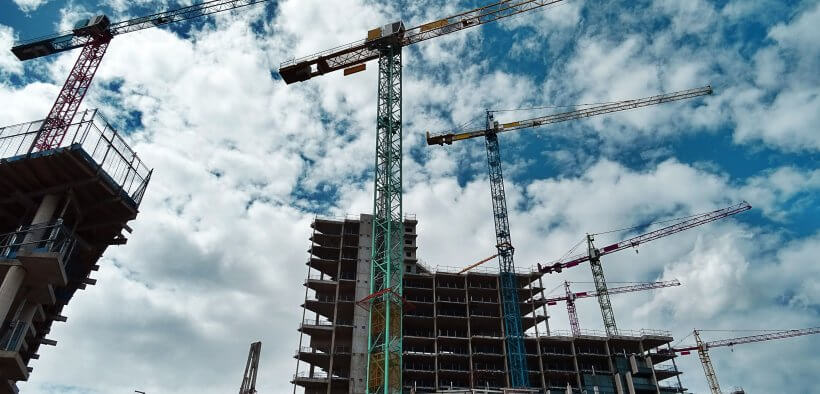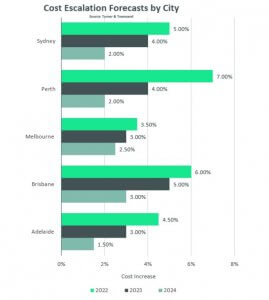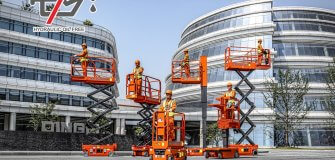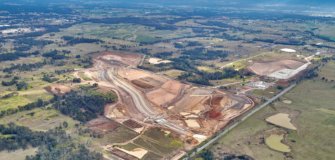Construction Costs Soar as Australia Ranks Fourth Most Expensive Labour Market
Martin Sinclair Jul 14

Australia has been reported as the fourth most expensive labour market in the world as the country sees costs (in the year to June 2022) soar by 10%, which, according to Cordell, is the biggest non-tax hike in costs since it’s records began.
Key findings by state – Q2 2022 Cordell Construction Cost Index Report
- NSW’s 2.5% rise in construction costs over the three months to June 2022 was its second largest quarterly increase in more than a decade. Annually costs have increased 10.1%.
- Victoria’s CCCI recorded a 2.5% increase in construction costs over the June quarter, up from 2.4% over the March quarter.
- Queensland saw construction costs rise by 2.3% over the June 2022 quarter, similar to the previous quarter (2.2%), and slightly less than the national quarterly growth rate of 2.4%
- Western Australia has recorded the second highest annual increase in construction costs, up 10.4% in the 12 months to June 2022. The quarterly increase of 2.3% was slightly lower than the national growth rate.
- South Australia has the highest annual increase in construction costs, up 10.5% and 2.2% over the three months to June 2022.
UK-based consultancy, Turner and Townsend, published a report this month that indicated that prices would peak this year and begin to weaken in 2023. However, the International Construction Market Survey showed that Australia is the forth most expensive labour market in the world, with an average hourly rate of USD$75.5. Switzerland is the dearest market with average labour costing US$118.
Perth the most expensive place to build
In the report, Perth ranked 36 out of 88 global cities, making it Australia’s most expensive building market, with an average cost of $2,822 per sqm, followed by Sydney (42) at $2,699 per sqm, Melbourne (44) at $2,666 per sqm, Brisbane (46) at $2,620.7 per sqm, and Adelaide (50) at $2,454.4 per sqm.
 Anooj Oodit, Managing Director ANZ and Asia for Turner & Townsend said all markets in Australia are expected to get “warmer” over the next 12 months.
Anooj Oodit, Managing Director ANZ and Asia for Turner & Townsend said all markets in Australia are expected to get “warmer” over the next 12 months.
Cost Improvements On the Horizon
CBRE Research Director Kate Bailey recently stated that while increases in the cost of construction is putting pressure on Australia’s pipeline, most cost escalations have now been built into project planning and further price increases are expected to be modest.
“While supply chain delays will persist, improvements are expected in early 2023 with cost increases from next year onwards to be largely driven by higher wage costs,” she said.
Demand Remains High
“The pipeline of construction approved during COVID is still being worked through and there’s been a number of major weather events as recently as this month, which require significant rebuild and repair work. This all adds additional demand-side pressure for construction materials and trades,” CoreLogic Research Director Tim Lawless said.
“There’s also no reprieve on the supply side either with a lack of materials, elevated fuel costs and broader inflationary pressures. All of these factors have an impact and are likely to push building costs higher for some time yet.”
Turner and Townsends report closely monitors market conditions and despite the industry facing tough conditions, construction activity continues to strengthen across global markets. 38.6 percent of markets they surveyed were classified as ‘hot’ or ‘overheating’.
30.7 per cent of city markets are reporting construction inflation for 2022 of 10 percent or more, with no correction or fall in costs expected soon.
These are times of increasing complexity and risk for large organisations managing diverse capital programmes. Proactive clients are tackling these challenges head-on by:
- Forming closer supplier partnerships
- Sharing risk
- Embracing innovation.
“We face headwinds on multiple fronts across the global construction sector and the broader international economy. The continued interconnectivity of markets is more apparent now than ever. We see near-universal inflationary trends founded on construction labour shortages, demand exceeding supply, and disruption in supply chains hitting costs and programmes” said Neil Bullen, Global Managing Director, Real Estate for Turner and Townsend.
To see their full report, visit: www.turnerandtownsend.com










